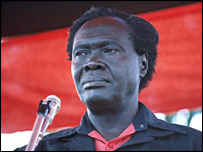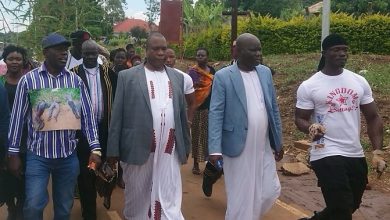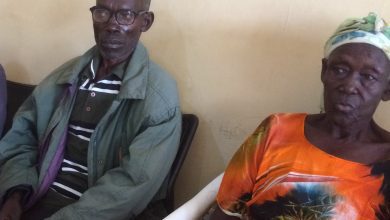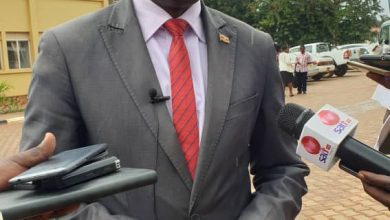
Global Politics
UGANDA: DR. APOLLO MILTON OBOTE’S OWN VERBATIM
This is the works of British Government, President Arab Mio told Dr. Obote when the met for breakfast in Nakuru state Lodge
I had learnt about it over many weeks that there was a political crisis involving the army.
The first ominous sign came when I was in Mbale on the Co-operatives Day. There was some movement of the army in Kampala. Paul Muwanga, [the Vice President], issued a statement in which he referred to
“uncoordinated troop movement.”
The troop movement apparently was about soldiers who were trying to cause the coup. They had organised support weapons from Mbuya [barracks] to move to Kampala. [Brig.] Smith Opon Acak,
[the army Chief of Staff] stopped it and then they started hunting for him. That’s why Muwanga referred to it as “uncoordinated troop movement.” After Mbale I returned to Kampala and appointed Brig. Livingstone Ogwang to investigate the uncoordinated troop movement. However, because my advisors like
[Gen.] Tito Okello and Paulo Muwanga were involved in the coup plots, Ogwang was frustrated; his inquiries went to nowhere. Bazillio [Okello] had been on leave in the north. Bazillio had found the Acholi trying to raise a militia against cattle rustlers from Karamoja and he joined them; it became his preoccupation.
Then Muwanga then came to me and said Tito Okello should go and bring Bazillio Okello back 2 to Kampala. I agreed and Tito went but he never came back. And when he did, it was with the invasion army, the coup army.
Then the late Henry Tungwako Deputy Minister of labour and the late Kasande came to me from Fort Portal and told me that the commanding officer there, an Acholi officer called Maj. Okwera had called Museveni’s rebels and handed over the town to them, then travelled to Kitgum to join Bazillio.
I told them that Okwera had been killed on his way to Kitgum by Bazillio’s troops who mistook his convoy to be Opon Acak’s convoy. In spite of all these happenings, I was not afraid of a coup. I was busy organising for the December 1985 elections and I was confident UPC would win.
The victory would put the coup plotters in a difficult position of attempting to overthrow a government with a renewed mandate. On the night of July 26th, 1985 I was in my office in Kampala, reading a World Bank report about prospects for oil in Semliki. I was trying to write a cabinet paper on it.
The World Bank report said there was oil in Semliki, and our job was now to exploit it. I now had to get the Cabinet know about it, and then to approve what we were going to do about it. Now, the problem about Semliki is that part of the oil was in Zaire.
That is when Muwanga rang me saying something was happening in Kampala; that he had sent his staff and found that all army officers had deserted their offices or stations. It was 1 a.m. on the morning of Saturday July 27, 1985. I called [Chris] Rwakasisi [state minister in the president’s office in charge of security] who told me that Muwanga had called him and told him the same thing by telephone. I said,
“Rwakasisi, Milton Obote is not going anywhere; if there is a coup, they will have to come and kill me here.”
Then I moved from my office at Parliamentary Building to Nile Mansion. Muwanga rang again and said, “Don’t remain in Nile Mansion and don’t go to Parliament Building, the thing might be serious.”
I called Rwakasisi again and a few other staff. We went to the home of my personal doctor, Henry Opiote, in Kololo. It was now 2 a.m. I did not go to my home in Kololo because Rwakasisi advised that it would be the first place the coup makers would attack. At Opiote’s home,
I told my colleagues that, “I am not going to move again; I fought Amin, I do not want to fight again. I am going to die here.” Rwakasisi said a very memorable thing. He said, “No, we have to get you out of here, out of this country because if you are alive we can fight back, if you are dead we cannot fight back.
So we are going to drag you out of here.” Then I began to yield my position. The issue was where do we go? We could not go to Entebbe 3 airport and use the presidential jet because it takes a lot of time to prepare to fly a plane.
We would have had to wake up the pilot, then taken time servicing it, fuelling it and we did not have all that time. We also decided that we could not take Mutukula road because that too was risky.
We could not travel to the west because beyond it there was Zaire and Rwanda and we were not sure about those either. My plan was to travel to Soroti where we had a strong militia we had trained to defend the people there against Karimojong cattle rustlers. We never discussed this, but we all agreed for were problems but we had to be humble.
I had advised my security staff not to oppose anybody, not to confront the soldiers at roadblocks. It was now coming to 5 a.m. Released at Jinja bridge, we continued on our way eastwards. Now, as we were speeding up, time was not on our side. We were getting late. When we reached the roundabout near Jinja town,
I asked my driver to go into Jinja town instead of going straight along the highway to Tororo. I wanted to create a diversion so that if anyone was following our convoy, they would get lost. Dr. Opiote did not know this and his car proceeded alone. I think when he realised we were not behind him he turned and came back and joined us along the road where we had stopped to wait for him. Now, there is a road from Magamaga, which goes to Busia, which I wanted him to take. So when Opiote came back I asked him if the driver knew the road from Magamaga to Busia. He did not. I had campaigned all over Uganda, so I knew the road. I wanted to avoid the main road to Malaba because since we had told soldiers at roadblocks in Mukono and Jinja,
I was suspicious the Okellos would learn that I had escaped from Kampala and follow the convoy. So I changed my plan of going to Soroti. We took that road from Magamaga to Busia and arrived in Busia town at about 6 a.m.
At the border a soldier tried to block our exit by closing the road because they had already learnt of the events in Kampala. Other soldiers just shoved him away and opened for us and we entered Kenya. We had no money, no passports, nothing.
My staff only told the Kenyans that “the president wants to enter” and they allowed us. While we celebrated our narrow escape, I was downhearted because of the coup. Dr. Opiote had just returned from America and he had some dollars in his pocket.
Other people who were with us had some money. So we bought gas and hit the road to Kakamega.
The Kenyan border security had informed the government of our coming. We were taken to a government lodge where I contacted President Moi to let him know that I was in his country and that I was running away from my own country.
Moi asked me to stay in the lodge and promised to contact us later. I think we stayed there for the whole day and night. President Moi made arrangements for me to meet him for breakfast the next day in Nakuru.
So we spent the night in Kakamega. Very early in the morning, about 3 a.m., we left for Nakuru and we arrived there at breakfast time.
I had breakfast with Moi and his Minister for Foreign Affairs. I briefed the president during 5 breakfast about the coup and I requested him for asylum. Moi was very clear; he said,
“This is a British orchestrated coup.” Now unfortunately as we were talking, his minister left the table and went to ring Nairobi reporting to the British High Commissioner what his own president had said.
The minister was called Elijah Mwangale. So after breakfast, the president told me my request to be in Kenya will be considered by the cabinet.
Meanwhile I had to go to Nairobi to stay with my friend Kitili Mwendwa. So I left the president in Nakuru and I drove to Nairobi to stay with my friend Kitili Mwendwa.
When I got to the home of Kitili Mwendwa I found Mama Miria was already there. She was in the house. Mama had been in Nairobi attending a women’s conference and was planning to return to Uganda that same day.
I briefed her about what had happened, and about the fate of our youngest boy, Ben, who was in Entebbe and another one, Tony, who was in Namasagali. My first plan was to contact my friend, [President Julius] Nyerere.
I called his home in Musasani, Dar es Salaam and he was not there. I called State House; they said he was not there. I asked his staff to ask him to call me in Nairobi.
He did not! I have never heard from him since. I felt betrayed by my friend Nyerere because he abandoned me.
Then I contacted President [Kenneth] Kaunda [of Zambia] who told me to wait; he was going to send me his ambassador.
The ambassador came that same evening to Kitili Mwendwa’s home and I asked for asylum verbally and then the High commissioner asked me to put it in a short letter, which I did. Kaunda first sent word that the aircraft was coming.
The aircraft arrived and we left for Lusaka, about 100 people. Apparently when I left Kampala, word got spread out that I had gone to Nairobi, and people just took off by plane, buses, by road, by various means to Nairobi.
Many of them knew Kitili Mwendwa was my friend and they flocked to his home. But the majority were accommodated by the government at the Police training school.
I came to Zambia. I was met by the Secretary General of the party, Grey Zulu, because President Kaunda was in the northern region closing the conferences of his party.
I was taken to a government lodge, which became my home for about two years before I came to the current house where I am staying. Kaunda returned, we met, we prayed. I briefed him and like Moi, he said this was a British coup.
So I remained in Zambia until now, from August 1985. One thing is for sure though, I have never taken a drink since I came to Zambia and this year I have also stopped smoking.





